|
|
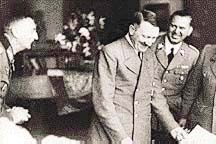 |
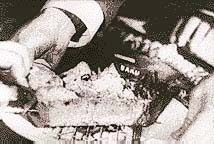 |
|
Photos: Hitler's mind was set to capture Baku's
oil. Even the date of attack was scheduled (September 25, 1942).
Anticipating a forthcoming victory, Hitler's generals presented
him with a cake of the region - Baku and the Caspian Sea. |
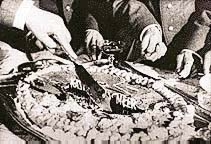
|
Baku-Main Source for Soviet Fuel Supply
On the eve of what came to be known as "The Great Patriotic War," Baku was the cradle of the Soviet oil industry, and as such, the major supplier of oil and oil products. In 1940, for example, 22.2 million tons of oil were extracted from Baku which comprised nearly 72% of all the oil extracted in the entire USSR. Consequently, the war could barely have been won had it not been for Baku oil and the fine quality of fuel that this city continuously supplied to the war front between 1941-45.
During that first year of the war, Azerbaijan produced 25.4 million tons of oil-a record for the entire history of its oil industry. Never before nor ever afterwards would Baku ever extract so much oil. By the Decree of the Supreme Soviet of the USSR in February, 1942, the commitment of more than 500 workers and employees of the oil industry of Azerbaijan was awarded orders and medals of the USSR.
By the end of 1941, thousands of Azeris had joined the so-called People's Voluntary Corps. Mobilization affected all spheres of life, particularly the oil industries. A week after fighting began, the oil workers themselves took the initiative to extend their work to 12-hour shifts, with no days off, no holidays, and no vacations until the end of the war.
By the end of the year, so many engineers and oil workers had left for the war front that positions had to be filled by women. By the summer of 1942, more than 25,000 women or 33% of all the workers were working 18 hour shifts in the oil industries. At refineries and chemical plants, the percentage of women was even higher estimated 38%. By 1944, women's participation had grown to 60%. Veterans and retirees also returned to the oil fields to help as much as they could.
Women's participation in factories, industrial plants and mills grew, too, as did work on agricultural projects. When the men left, it was the women who became machine operators and tractor drivers, replacing their fathers, husbands and brothers. Though the traditional role for women in rural families had always been confined to the home, the women worked hard in the fields to supply the front with cotton, corn, wool, tobacco, tea and many other crops. By 1942, for example, Azerbaijan became the second largest tea producer of the Soviet Army. (Madatov 47, 63).
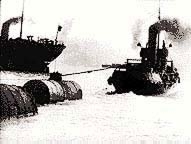 |
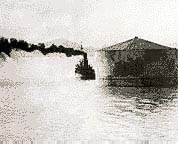 |
Above: Baku sailors were desperate to find new ways to get the oil to the war front. Since there weren't enough tankers to do the job, they improvised ways to tow cisterns across the Caspian Sea to Krasnovodsk, Turkmenistan (1942).
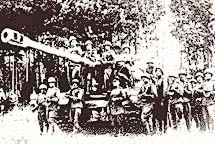
![]() Left: Hazi Aslanov leading his armored troops in Belarus
1943. Aslanov was awarded the highest Soviet national medal of
heroism in World War II.
Left: Hazi Aslanov leading his armored troops in Belarus
1943. Aslanov was awarded the highest Soviet national medal of
heroism in World War II.
Hitler Wanted Baku
Hitler was determined
to capture the oil fields of the Caucasus including those in
Maikop (Russia) and Grozny (Chechnya). But most of all, he wanted
Baku. Hitler was obsessed with oil.
He read about it, talked about it, and knew the history of the
world's major oil fields. If he captured the oil of the Caucasus-along
with the 'black earth,' farmlands of the Ukraine, he was convinced
that the German empire's New Order would be self-sufficient within
its own borders and thus invulnerable. (Yergin, 334).
The operational plan given to Hitler's assault in the Caucasus
was "Edelweiss" (the name of the tiny white flower
which grew on alpine mountainous slopes). To reach Baku, the
German Führer would have to cross the Great Caucasus Range
and thus the symbolism.
It's interesting to note that, originally, the German leaders
had no plans to bomb Baku. Hitler's objective was not to destroy
the oilfields but to be able to utilize them for his own troops.
Plans to Bomb Baku
by Allies
On the other hand, Great
Britain and France, which were the most active European nations
attempting to counter Hitler's attack, seriously considered the
possibility of bombing Azerbaijan's oil fields.
According to archival materials recently discovered, before the
war broke out, both England and France were deeply concerned
that Stalin's supply of Baku's oil might be transferred to Hitler
after the Soviet German Pact was signed by the Foreign Ministers
Molotov and Ribbentrop on August 23, 1939. This didn't happen.
But it was Ribbentrop himself who later observed, "When
the Russians run out of oil, we'll bring them to their knees."
The US Ambassador to France, W. Bullitt, dispatched a telegram
to Washington concerning "the possibilities of bombing and
demolition of Baku" which were being discussed in Paris
at the time. The operation was to have been carried out by the
French Air Forces in Syria.
On October 31, 1939, such attacks were actually under discussion
at the British General Headquarters. However, by that time most
politicians and diplomats in the UK were opposed to bombing Baku.
Prime Minister Chamberlain and Winston Churchill as Minister
of Naval Forces, openly expressed their disapproval and tried
to convince the others that a more feasible plan would be to
prevent the transportation of oil in the Black Sea with British
submarines.
 |
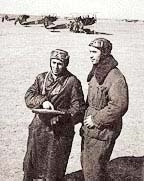 |
Left: Azerbaijanis made an incredible contribution to medical field during the war. Here Surgeon, Mustafa Topchubashev, operates on a wounded soldier. An estimated 440,000 soldiers were treated in Baku hospitals between 1941-45.
Right: Azerbaijan's first woman pilot of the war, Leyla Mamedbeyova with her son, Rustam.
Charles de Gaulle was extremely
critical of the plan according to both his wartime and postwar
statements. Such ideas, he believed, were made by some "crazy
heads that were thinking more of how to destroy Baku than of
resisting Berlin."
Nevertheless, the French Government ordered General Gamelen and
Admiral Darlan to work out a "plan of possible intervention
with the view of destroying Russian oil exploitation." Ambassador
Bullit informed US President Franklin D. Roosevelt that Daladye
considered that aircraft attacks against Baku would be "the
most efficient way to weaken the Soviet Union."
On January 11, 1940, the British Embassy in Moscow notified London
that demolishing Baku's oil fields would be "a knock-out"
for the Soviets. According to the document, "Basic Strategies
of the War" submitted on January 23, 1940, to the British
General Headquarters by the Staff Commands, "The Russian
economy was strongly dependent on oil supplies from Baku",
a region which was easily accessible for British dive-bombers
stationed in Iraq.
Mr. McLeen, a Sovietologist with the British Foreign Office,
observed that British and French Air Forces would be able to
cause substantial damage both to the oil wells and refineries
in Baku and the northern Caucasus, as well as to the system of
pumps and oil pipelines between Baku and Batum (Georgia).
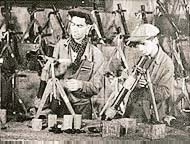
![]() Left: Azeri youth in Baku were heavily involved
in the war effort, working in factories that had been converted
for manufacutring war materiel (1943).
Left: Azeri youth in Baku were heavily involved
in the war effort, working in factories that had been converted
for manufacutring war materiel (1943).
According to a report submitted
on February 22, 1940, by General Gamelen to French Prime Minister
Daladye, since Baku provided 75% of all oil requirements of the
USSR, he believed the Soviets would fall into crisis if those
sources were lost.
"Dependence on oil supplies from the Caucasus is the fundamental
weakness of Russian economy. The Armed Forces were totally dependent
on this source also for their motorized agriculture. More than
90% of oil extraction and 80% of refinement was located in the
Caucasus (primarily Baku). Therefore, interruption of oil supplies
on any large scale would have far-reaching consequences and could
even result in the collapse of all the military, industrial and
agricultural systems of Russia."
In April 1940 Intelligence flights by the British and French
Air Forces did fly over the Absheron Peninsula where Baku is
located. However, the bombing mission was not carried out although
everything was in place to do so by the end of June. More likely
than not, this was meant as a threat to pressure Stalin's regime.
However, after Hitler invaded Holland, Belgium and France on
May 10, 1940, the "Absheron targets" lost their significance.
Hitler Pushes Toward
Baku
But by late July 1942,
Hitler's quest for Baku seemed well on its way to achieving his
goal. The Germans had already captured the city of Rostov and
severed the oil pipeline from the Caucasus. On August 9, they
reached Maikop, the most westerly of the Caucasian oil centers-which
turned out to be quite a small source for the Germans. Even under
normal conditions, Maikop's production was only one tenth that
of Baku's. However, before withdrawing from the city, the Russians
had thoroughly destroyed the oil fields and supplies and equipment,
right down to the small incidental tools of the workshops. Consequently,
by January 1943, the Germans were able to eke out no more than
70 barrels per day there (Yergin, 336-337).
"Still, the Germans drove on, now thousands of miles from
their homeland and supply centers. In mid-August, German mountain
troops planted the swastika at the summit of Mount Elbrus, the
highest point in the Caucasus and in Europe (Yergin, 337).
The determination to capture Baku was so intense that the date
for the final attack and seizure had been fixed-September 25,
1942. A few days prior, Hitler's generals presented him with
a large decorated cake which depictedthe Caspian Sea and Baku.
Documentary films show how amused Hitler was at the gesture and
how he chose the most desirable piece-Baku-for himself. Fortunately,
for Azerbaijan and the Allies, Hitler's attempt to devour Baku
was confined to the icing on this cake. Fate changed and he didn't
get the chance to "have his cake and eat it, too",
as the saying goes.
Fortunately, Hitler's strategy of fighting on two fronts-Stalingrad
(Volgograd) and the Caucasus-spread his resources too thin and
proved disastrous. Field Marshal Erich von Manstein supposedly
begged Hitler to transfer the German forces in the Caucasus to
his command in order to help the embattled Sixth Army at Stalingrad,
but the Dictator's mind was set, "Unless we get Baku's oil,
the war is lost." He then proceeded to rant on about the
central importance that oil had assumed in warfare and how much
fuel a single aircraft or a tank needed. "If I can no longer
get you the oil for your operation," he purportedly told
the Field Marshal, "you will be unable to do anything."
Manstein tried to argue about the immediate strategic issue-the
survival of the Sixth Army but Hitler would not listen. Instead,
he focused on how the German armies would meet up in the Middle
East and then march through Iran and Iraq as an assembled force
finally convening in India, where they would seal their final
victory over England (Yergin, 338).
Because of his misjudgment, Stalingrad became German's first
major defeat in Europe and Baku was never captured.
Squeezing Old Wells
for the Last Drop
But at that time, no
one knew what the outcome would be. In the summer of 1942, the
threat of attack became so strong that the Soviet authorities
decided to terminate drilling operations to evacuate the most
valuable machinery and equipment further East. By autumn, 764
wells in Baku were sealed and 81 complete sets of drilling equipment
together with the personnel were transported to Turkmenistan
(Madatov, 129).
And thus, the oil producers in Baku were caught in a huge dilemma:
at the exact time when their own production was being reduced,
the demand for fuel was increasing. To resolve the problem, machine
building and equipment manufacturing plants in Baku began converting
their factories, and diversifying production. Working around
the clock, they were able to manufacture sufficient piping at
the Azneftecombinat factory to repair 25 old wells that had not
been used for decades. Since it was impossible to drill new wells,
the old ones were exploited to full capacity. Unfortunately,
consideration for the environment was not part of the formula.
A glance at Azerbaijan's oil fields today is a reminder of the
tremendous pressure that the war placed on oil production at
any cost.
The Caspian Shipping
Company
Another problem inseparably
tied to fuel production was its transportation. By the summer
of 1942, the enemy had blocked the main railways through which
oil and its derivative products were transported. Thus, alternate
means of transport had to be found via the Caspian and Volga
water way. When the Germans also succeeding in blocking this
route, transportation was routed through Central Asia.
But the front couldn't wait. Aircraft, armored carriers, trucks,
and tanks all needed fuel. Then the naval experts of the Baku
oil-tanker fleet performed an incredible feat. For the first
time in the world's history, they began towing a floating railway
of oil tankers (wagons) from Baku to Krasnovodsk (Turkmenistan)
as well as several thousands tons of oil reservoirs from Makhachkala
(Dagestan) to Krasnovodsk.
The fleets were extremely overloaded. For example, the amount
of oil transport in July 1941 exceeded 10 million barrels of
crude oil and fuel. This amount was beyond the technical capabilities
of the tanker fleet in Baku. But the demands from Moscow did
not take into account the physical limitations. It was then that
Baku naval experts hit upon the idea of attaching whole tanks
and cisterns to each other by steel ropes and lowering them into
the sea by cranes and towing them by steam tugs. This had never
been done before in any place in the world and it enabled them
to tow up to 35 cisterns together or 3 huge oil tanks (5 ton
capacity) with a single tugboat.
Closing the Wells
Meanwhile, the enemy
was closing in on Baku. On September 9, 1942, martial law was
declared in Transcaucasia. The danger of an attack on Azerbaijan
was becoming more likely. The emergency measures which had been
prepared beforehand were set into operation-Azerbaijanis began
closing the functioning wells with plans, if necessary, to explode
the wells themselves so that the Germans wouldn't get a single
drop of oil.
Those were tragic days. As Yakov Aragunav writes in his book,
Oil and Victory, it was especially painful since so much labor
and effort had been put into every well. The workers had labored
day and night to supply the front with oil. And now they were
being required to destroy everything with their own hands. It
was so sad to see some of these same people who had, more than
once, risked their lives in putting out oil fires, now having
to close the bore holes. So often they did it with tears in their
eyes as if they were burying their very own relatives."
Setting Up the
"Second Baku"
Because of the crisis,
the State Defense Committee decided to transfer the main forces
of oil-workers and oil enterprises of Baku to the regions of
Volga, Ural Mountains, Kazakhstan and Central Asia for the enforcement
of the oil extraction there. In October, 1942, more than ten
thousand oil workers left for these eastern parts.
All the nine drilling offices, oil-expedition and oil-construction
trusts as well as various other enterprises with their staffs
were transferred to an area near Kuybishev, (Russia Federation
in Tartarstan near the Ural Mountains north of Kazakhstan). This
city soon came to be known as "the Second Baku" as
highly qualified specialists and masters in oil industry were
sent there along with more than 5,000 workers as well as half
of the equipment.
The weather in the region was bitter for the Bakuis who were
used to a temperate climate. In the winter, the temperature dropped
to as low as 30-35° C. below zero. Despite the hardship,
they tried their best to apply their knowledge and experience.
Despite the severe frost the drillers started searching for oil.
Winter was over but spring brought torrential rains and flooding.
The small river, Kinel, overflowed its banks and the water rose
3-4 meters, flooding the mouths of wells, causing considerable
loss of oil. The Bakuis, who were up to their waists in the icy
water, defended the wells. All in all, with such determined efforts,
the new Bakuis in the region of Povolzhye, increased the fuel
extraction in "Kinelneft" trust that first year by
66% and by 42% in entire region of Kuybishev.
They did it the "Bakui way" which meant not allowing
the decrease of oil extraction or cessation of drilling in winter;
working in winter as hard as in summer, working at night as much
as in daytime; and generally increasing the oil extraction by
any means possible. As a result, five new oil and gas fields
were discovered and huge oil refinery construction projects were
undertaken, including the first pipe line between Kuybishev and
Buturslan was built that same year. The pipeline rendered a tremendous
service to defense factories saving them the trouble of importing
coal and mazut (black oil) from remote places.
A number of large modern oil refineries were also built in Kuybishev.
But the most significant assistance that Bakuis gave was in extracting
oil from the Devonian Strata in Kuybishev for the first time
(June 9, 1944). This historical event marked the beginning of
industrial development unprecedented in its volume. It made it
possible to restore oil extraction to pre-war levels and Russia
became the largest oil industry power in the entire world.
Nevertheless, back in Azerbaijan, the oil workers searched for
new ways of supplying the front with oil, diesel and aircraft
fuel. Young boys and girls came from collective and state farms
to help the oil workers.
Beginning in late 1943 when the front line was gradually withdrawing,
the intensification of drilling work in Baku was reestablished.
However, the sealing off of a number of wells turned out to be
a tragedy. Many of them were impossible to restore. Eventually,
the oil extracting had considerably been reduced by the end of
the war: in 1945 only 11.5 million tons of oil was extracted.
Perhaps, the irony of the war is that after Azerbaijanis worked
so hard to produce the oil first in Baku and then in the "Second
Baku", and after their efforts clearly determined and shaped
the outcome of the war, never again was their production equivalent
to the output of the early 1940s. Relatively little investment
was made to re-activate or invest in Baku's fields onshore, many
of which could never be productive again after being closed.
Moscow began focusing on the new fields in their own Federation
which promised vast reserves, fields that Azerbaijan's specialists
had done so much to help develop. Apart from Oily Rocks, Azerbaijan's
first offshore field which was opened in the early 50s, investment
was not made to exploit the deeper reserves. As a consequence,
Azerbaijan today, 50 years later, as an independent Republic,
is left with one of the largest known undeveloped offshore reserves
in the world today.
References
Abbasov,
Mazahir. Baku
During the Great Patriotic War.
Madatov, G. 1975. "Azerbaijan During the Great Patriotic
War" (Baku)
Yergin, Daniel. 1991.
"The Prize: The
Epic Quest for Oil, Money and Power" (New York).
Fuad Akhundov writes a regular column in Azerbaijan International.
Fikrat T. Aliyev is Director of the State Archives (Department
of Contemporary History). Special appreciation goes to Nina
Fischeva, Director of the State Archives (Photo and Cinema
Materials) for selection of photos and stills from the documentary
film of "Hitler's special cake". Special appreciation
is extended to Farid Jabbarzade for his technical assistance
in the preparation of this article.
From Azerbaijan International
(3.2)
Summer 1995.
© Azerbaijan International 1995. All rights reserved.
Back
to Index AI 3.2 (Summer 1995)
AI Home Page
| Magazine
Choice
| Topics
| Store
| Contact
us
